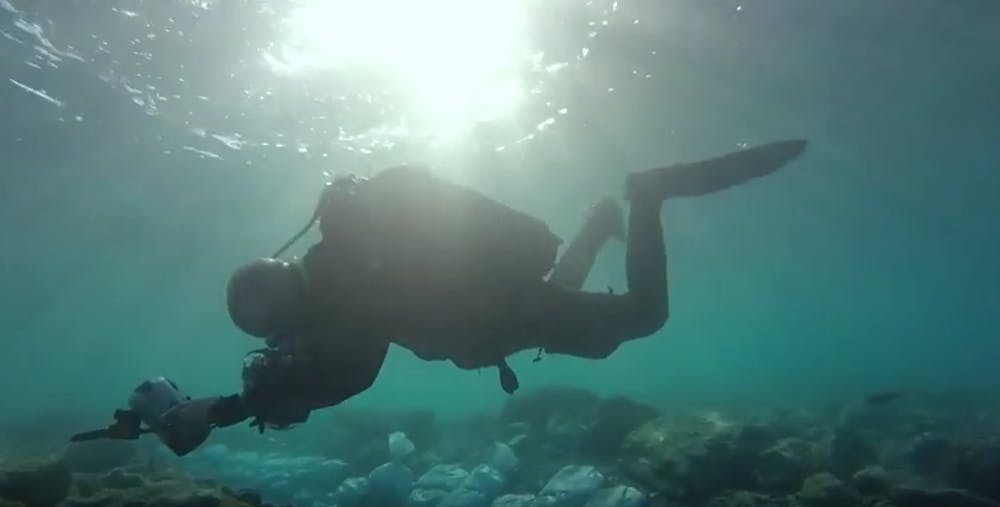Archaeologist Bjørn Lovén described his team’s discovery of ancient sunken Athenian ship-sheds and naval facilities, which were pivotal in maintaining the world’s first democracy, in a lecture on campus Thursday evening.
The lecture was one in a series hosted by University of Richmond Department of Classical Studies and the Archaeological Institute of America.
Lovén has worked with the Zea Harbor Project since 2000 uncovering these naval bases in Piraeus, Greece, which served as a main port for ancient Athens.
These ship-sheds were roofed structures that housed triremes, ancient Greek warships manned with 170 rowers and known to be swift in battle, Lovén explained. Archaeologists have yet to discover a trireme and many consider it to be the holy grail of underwater archaeology.
Ship-sheds were vital in protecting the triremes from marine worms and the heat of the Mediterranean sun. Otherwise, the entire fleet would be rendered useless quickly. The discovery of the extensive shipsheds provides greater context and understanding of the Athenian navy.
Lovén also discussed the history of the Athenian navy, particularly in light of the Athenian politician and general Themistocles. Elected archon or ruler in 493 B.C., he pushed for a strong Athenian navy, which ended up playing a vital role in protecting Greece from two Persian invasions.
Lovén specifically highlighted the Battle of Salamis, which took place during the second Persian invasion, where, against all odds, the Greeks defeated the Persians.
“It created a very strong cohesion between the citizens in Piraeus and, in this respect, the Athenian navy would become the backbone of the democracy,” he said.
One major discovery for the team came in 2010, when they met a fisherman who said that, as a young boy, he would sit on an ancient column coming out of the water and fish. Skeptical but still interested, the team followed the man to an area of the Mounichia Harbor where they immediately discovered three massive column bases.
The process of excavating the ship-sheds was slow and tedious, as doing underwater archaeology is 20 times slower than doing excavating on land. On top of that, visibility underwater was highly limited because of the water’s murkiness.
Elizabeth Baughan, a professor of classics and archaeology and president of Archaeological Institute of America Richmond branch, said that the most significant discovery Lovén had made was of the double length ship-sheds. These ship-sheds allowed for ships to be stored end to end and, until Lovén’s discovery, had only been theorized to exist.
Lovén also discovered cuttings that were at a distance from each other, which indicates that these slips may have been used for even larger ships, Baughan said. These behemoth ships that would have used five rowers per oar have been written about in literary sources but never found.
Enjoy what you're reading?
Signup for our newsletter
“Archaeology tends to do that,” Baughan said. “You may find what you think you’re looking for and then you find that thing that makes you want to look more.”
Michael Phillips, a collector of 19th century American furniture, attended the lecture because of his interest in archaeology. He majored in archaeology at the University of Virginia in 2007 and had a passion for ancient Greece, especially after having visited Athens and the Athenian port last September.
“When I went to Greece, I came back thinking I wanted to be an archaeologist again,” he said.
The next lecture in the university's series is titled “Lust in the Dust: Erotic Curse Tablets Unearthed at Nemea Greece” and will be presented by Jorge Bravo on April 20.
Contact reporter Kay Dervishi at kay.dervishi@richmond.edu.
Support independent student media
You can make a tax-deductible donation by clicking the button below, which takes you to our secure PayPal account. The page is set up to receive contributions in whatever amount you designate. We look forward to using the money we raise to further our mission of providing honest and accurate information to students, faculty, staff, alumni and others in the general public.
Donate Now



